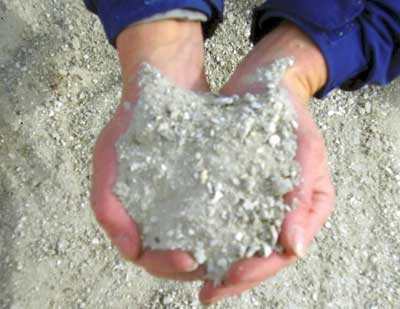
Bentonite is a clay mineral predominantly consisting of Montmorillonite mixed with related minerals Nontronite and Beidellite. These are three layered Aluminosilicate with molecules of water between layers. For natural sodium Bentonite, exchangeable sodium cations are more predominant than other cations like calcium and magnesium. Similarly in calcium Bentonite, calcium cations are predominant. In all Bentonite available in the world, the sodium variety has high swelling and gelling properties, good viscosity and good liquid limit.
The variety of Bentonite found in the Kutch region of India is of igneous origin. It was formed millions of years ago possibly from volcanic ash falling in stagnant saline water in semi-arid conditions. Due to the natural characteristics of these volcanic ashes, the chemical composition of this particular variety is different from those found in the rest of the world. Most of these deposits are natural sodium Bentonite with higher iron content. Darker in color and having a very fine particle size, this clay mineral shows extraordinary swelling capacity and bonding powers. These properties make this Bentonite applicable for usage in various industries in the world.
Bentonite Applications
Well Drilling
Drilling mud, or drilling gel, is a major component in the well drilling process. Drilling mud is crucial in the extraction of drill cuttings during the drilling process. Bentonite, when mixed with water, forms a fluid (or slurry) that is pumped through the drill stem and out through the drill bit. The Bentonite extracts the drill cuttings from around the bit, which are then floated to the surface. The drilling mud, or gel, also serves to cool and lubricate the drill bit as well as seal the drill hole against seepage and to prevent wall cave-ins.
Taconite Pelletizing
Taconite, a low grade iron ore, has been developed as an economic source for iron. During processing, the taconite is ground into a very fine powder. The ground taconite is then mixed with small amounts of Bentonite which serves as a binder to the taconite. This mixture is processed into balls or pellets. The process is finished when these pellets are sintered in rotary kilns that give the pellets a hard surface.The taconite pellets are easy to handle at this point and can be loaded into various containers for shipment to steel
mills.
Metal Casting
Bentonite serves as an economical bonding material in the molding processes associated with the metal casting industry. Bentonite, when mixed with foundry moulding sands, forms a pliable bond with the sand granules. Impressions are formed into the face of the Bentonite/sand mixtures. Molten metal is poured into the impressions at temperatures exceeding 2,800 F. The unique bonding characteristic of bentonite insures the durability of the mould during these high temperatures. Once the process is complete, the Bentonite/sand mold can then be broken away from the casting face and reused.
Cat Litter
In recent years, Bentonite has become a major component in the manufacturing of cat litter. Because of the unique water absorption, swelling, and odour controlling characteristics of Bentonite, it is ideal for use in “clumping” types of cat litters. Clumping cat litter has become widely accepted as an economical alternative to conventional non-clumping type cat litters. Because Bentonite forms clumps when wet, the clumps can easily be removed and disposed of. The remainder of the unused material stays intact and can continue to be used. Clumping cat box litters will last longer with less frequency of changing.
Animal/Poultry Feeds
For many years Bentonite has been used as a binder in the feed pelletizing industry. Small amounts of Bentonite can be added to feed products to insure tougher, more durable pellets. By absorbing excess moisture and oils, Bentonite aids in the free movement of pellets, preventing lumping and caking. Research has been conducted which indicates that Bentonite has additional benefits for both animals and poultry. The Bentonite used in the feed slows the digestive system and enables the animal or fowl to better utilize the feed nutrients. Other studies have shown Bentonite as a useful ingredient in the control of certain toxins which affect
animals and fowl.
Other Applications
Bentonite has also proved helpful in sealing freshwater ponds, irrigation ditches, reservoirs, sewage and industrial water lagoons, and in grouting permeable ground. In addition, it has been used in detergents, fungicides, sprays, cleansers, polishes, ceramic, paper, cosmetics and applications where its unique bonding, suspending or gellant properties are required.